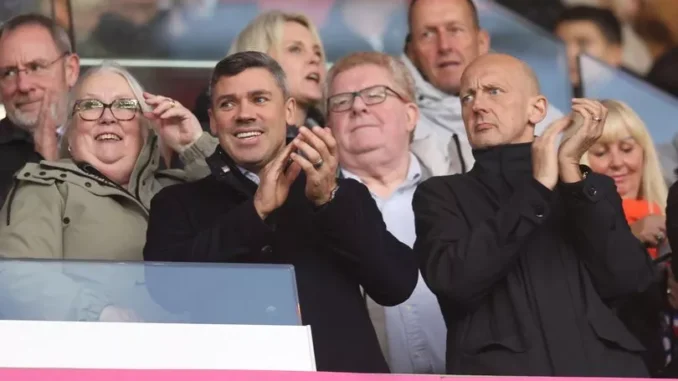
John Coates is ready to shoulder any ongoing losses at Stoke City as they lobby to try to change Financial Fair Play rules to allow for ‘sustainable investment from committed owners’
Stoke City’s latest financial figures have been revealed in new accounts posted by the club. These figures cover the 2023/24 season so are slightly different than the numbers that were published recently by then parent company bet365, which ran to the end of March 2024.
In brief, they show Stoke made an operating loss of £26.3 million but that number in itself doesn’t quite tell the full story so here we try to unpack what it all means.
Money spent on infrastructure does not count towards Financial Fair Play calculations and Stoke, constrained in the transfer market, have been spending a lot on this over the last few years.
There was £6.1m spent in 2023/24, which included the new LED lighting system at the bet365 Stadium and starting work on the Boothen Quarter fan zone, which opened at the start of the 2024/25 season.
That was on the back of an £8.2m investment in 2022/23 and work has since been launched on a new £12m first team facility at Clayton Wood, which is scheduled for completion in December.
The stadium and training ground were both transferred back to ownership by the club from bet365 as part of a restructure last summer that saw John Coates take sole charge. It will be a bonus for Stoke in the 2024/25 season not to have to pay an annual lease of about £9m to bet365 for the stadium and training ground.
The frenetic 2023 summer transfer window
Accounts show a transfer net spend in 2023/24 of £6.1m “principally due to the revenue generated from the sale of Harry Souttar in January 2023 (the previous year’s accounts) being reinvested in the playing squad during the subsequent summer transfer window”. Stoke also brought in £4.4m in by selling Josh Tymon to Swansea and Jacob Brown to Luton.
But the £18.2m signings made in the summer of 2023 have not been as successful as Stoke had hoped from a big reset, when then-manager Alex Neil and then-technical director Ricky Martin, with then-newly appointed head of recruitment Jared Dublin, had a near-blank slate to build a squad.
Big buys included Wouter Burger, Bae Junho, Million Manhoef and Ryan Mmaee while seven-figure deals were agreed for Junior Tchamadeu, Nikola Jojic, Mehdi Leris and Lynden Gooch.
Some have already left or been written off while Burger, Junho, Manhoef and Tchamadeu are the ones left flying the flag for that year’s recruitment. It will be interesting to see if, in time, how much the club recoups, loses or is successful in the Championship with that intake.
The wage bill rose by 14 per cent to £34.4m.
In the here and now there is a depressing line in the accounts next to the figures charting how much was spent. It compares the final league position in 2023 (16th) to the final league position in 2024 (17th).
A statement from Stoke said: “As for any football club, staff and player costs remain the most significant expense. The directors will always seek to maximise the cash available to spend on player wages within the constraints of the income and costs of the business and profit and sustainability rules.”
Stoke City reliant on backing from the Coates family
Never mind FFP for a second, in the real world as a business Stoke ended up with a cashflow deficit before owner funding of £34.3m. Football finance expert Kieran Maguire said recently: “To lose more than £30m when you’ve only got £23m or £24m coming into the club – in any other business you’d say let’s call the whole thing off.”
But football is not like any other business and the staggering £676,000 that Stoke have been losing on average per week since relegation from the Premier League in 2018 is not even all that unique in the mad world of the Championship where there is a huge revenue disparity between clubs with and without parachute payments – and that is still dwarfed by the disparity with what clubs earn even at the bottom in the division above.
The EFL is lobbying for changes in distribution but there is an admission in the board’s strategic report that ongoing losses are expected and that they will cover them while also pursuing a change in financial regulations to allow for more “sustainable investment from committed owners”.
It says: “The directors are aware that, in common with virtually all clubs in the Championship, the club will continue to operate with underlying annual financial losses unless and until: the club is promoted back to the Premier League, which remains the directors’ principal objective; the funding formula within English Football is changed to provide more income for clubs outside of the Premier League; and/or further profits are made from player sales such that they balance the trading losses being incurred.
“In the absence of the above, the owner not only remains committed to fund the ongoing losses of the club but also acknowledges the desirability to provide this funding through non-refundable, non-interest bearing share capital.
“The directors are currently restricted from implementing their full plans for the club as a result of the financial regulations implemented by the EFL in the Championship that currently prevent their use of sustainable investments that would otherwise be made.
Read more at;https://sportupdates.co.uk

Leave a Reply